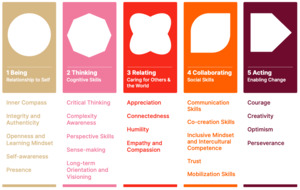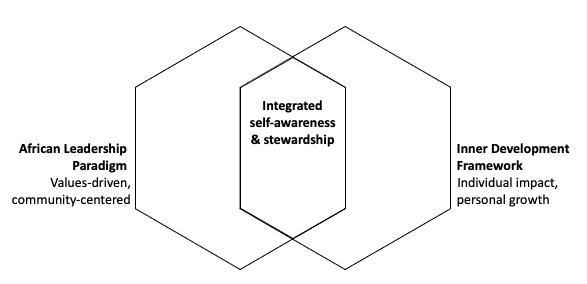Introduction
The 2022 UN Sustainable Development Goals report highlights a concerning decline in the quality of life on land and water in Africa due to human impacts (United Nations, 2022: 52). Climate migration, cultural conflicts, resource scarcity, and species extinction are increasingly frequent across the continent (Boiral, Baron, & Gunnlaugson, 2014). In many African nations, business and corporate environmental irresponsibility is common; perhaps a symptom of weak government regulations and enforcement, exacerbated by higher corruption and unlawful behaviours (Lauwo, Azure, & Hopper, 2022).
Initially, the climate and sustainability crisis was framed as an external, technical problem to be solved, rather than a systemic issue linked to culture, leadership, and social dynamics (Wamsler, Osberg, Osika, Herndersson, & Mundaca, 2021). Environmental challenges are deeply rooted in social contexts and are inherently complex in Africa (Leichenko & O’Brien, 2020). Technical or techno-scientific solutions alone have proven insufficient to induce the internal leadership shifts required for transformative sustainability (Wamsler et al., 2021). An Inner to Outer development approach, such as embraced in the Inner Development Goals (IDG), emphasises leadership as not only skill-based but also involving spiritual and moral dimensions or rather the “who we are” as leaders. This refers to a being-centred leadership philosophy that integrates spirituality with ethical development as well as levels of consciousness and being (Wilber, 2006). Morality involves discerning right from wrong; however, in leadership, decisions benefiting one stakeholder (e.g., the business) may harm another (e.g., the environment). Such moral dilemmas are common across Africa. An integration of the African leadership paradigm and an inner development approach of leaders, offers a pathway to navigate these complexities, foster meaningful growth as well as contribute positive impact toward the sustainability objectives of the African continent.
Literature Review: Africa Today
“More science and more technology are not going to get us out of the present ecological crisis until we find a new religion, or rethink our old one” (White, 1967: 1206).
Progress toward sustainability in Africa remains moderate, with social challenges often prioritised over environmental concerns (Lauwo et al., 2022). Unhealthy environments contribute to climate migration, disease outbreaks, and food insecurity (Prüss-Ustün et al., 2017). About 25% of the global disease burden could be prevented by reducing environmental hazards, of which many are linked to business and industry. Despite urgent calls for corporate change, businesses largely continue “as usual” from a global and regional African perspective (Ripple et al., 2020).
Economic growth is often framed as Africa’s development priority, and punishing irresponsible business may be perceived as hindering much needed progress (Lauwo et al., 2022). However, the debate is not about whether development is a necessity, but about how African leaders can balance care for people and planet alongside generating a profit and developing the continent. This means shifting the power dynamic between business and nature (Ripple, Wolf, Newsome, Galetti, Alamgir, et al., 2017), and moving beyond viewing nature merely as a resource to be exploited but towards the growth and opportunities it enables if given the chance to flourish and regenerate.
The African Union (AU) Agenda 2063 and the UN SDG 2030 goals emphasise sustainable development, poverty eradication, good governance, and inclusive growth. Both agendas highlight leadership development, with an urgent call for strategic, ethical and responsible leaders who can implement these frameworks effectively. Contextualizing these goals to local African realities and the leadership development that is required to follow the call is vital. From a leadership development perspective, there is a growing need for fostering inclusive, ethical, and caring leaders who promote transparency, social justice, sustainable innovation, collaboration, and resilience in the face of Africa’s complex challenges. Both agendas underscore the interconnectedness of social, environmental, and economic factors, reinforcing the need for holistic leadership approaches.
Inner Dimension of a Sustainable Leadership Transformation in Africa: An Integration of Inner Development and the African Leadership Paradigm
“Transformation requires a shift in people’s values, referred to as the inner dimension of sustainability, or change from the inside-out” (Horlings, 2015: 163).
Sustainable leadership stems from intrinsic motivation driven by deep leverage points, for example these are internal values, beliefs, as well as lived experiences. These inner dimensions can spark transformational mindset shifts, enabling leaders to address Africa’s sustainability challenges and contribute to systemic change (Woiwode et al., 2021).
This call for a fundamental inner shift challenges the unsustainable political and economic status quo in Africa. An inner-to-outer transformation targets the invisible root causes of unsustainability embedded in social, cultural, economic, and political systems. It demands a radical reorientation of leaders’ value systems and relationships, which often unconsciously shape their meaning-making, thinking, and behaviour (McPhearson et al., 2021). Westley et al. highlight the urgency for “radical, systemic shifts in deeply held values and beliefs, patterns of social behaviour, and multi-level governance and management regimes” (2011: 762).
The Inner to Outer Sustainability Transformation Construct: The IDG Framework
This profound transformation is neither instantaneous nor spontaneous. Motivated by this challenge, a group of researchers and practitioners, primarily from Europe and North America, developed the Inner Development Goals (IDG) framework to promote sustainable global impact (IDG, 2023). The IDG framework (Figure 1) encompasses five categories, Being, Thinking, Relating, Collaborating, and Acting, with 23 associated skills and values. It offers a novel approach to personal growth and leadership development by focusing on inner capacities that enable sustainable behaviours.
The IDG framework emerged from global research including a survey and expert input, currently a revision of the framework including research teams across the globe is in progress. In Africa’s complex context, leaders often display visible actions that conflict with their internal motivations such as prioritising return on investment over environmental ethics. Leadership development that focuses on the personal and internal can address these cognitive and moral dissonances.
“When we go beyond content [what] and processes [how], we address the why, which can lead to transformative learning” (Rimanoczy & Klingenberg, 2021).
The African Leadership Paradigm
Traditional African leadership embodies a relational, holistic, and land-based worldview that embraces the inner dimensions of human beings (Mbigi, 2005). Central to this is Ubuntu, a philosophy valuing community and recognising leaders by their service to humanity. Ubuntu resonates strongly with the IDG framework’s values and skills, but more importantly, it provides a regional contextualisation relevant and resonant with the African continent. Indigenous communities across Africa, the Americas, and Asia share a spiritual conviction that all life is sacred, recognising the interconnection between people, nature, and the spiritual realm:
“…recognition of the interconnection, interrelationship and interdependency of people and the natural and spiritual realms … positions Indigenous peoples as stewards of the land with a responsibility to ensure all of their interactions are sustaining and respectful … obliged to care for, respect, conserve and promote the wellbeing of flora, fauna and people…” (Mika, Colbourne, & Almeida, 2020: 261).
This worldview provides a holistic foundation aligned with the philosophy of the inner-to-outer sustainability transformation too. As can be seen in Figure 2, the African leadership paradigm focuses on listening, empathy, persuasion, healing, self-discipline, and consciousness (Mbigi, 2005).
Furthermore, the African leadership model integrates spirituality, moral and ethical development, which refers to higher states of consciousness (Wilber, 2006), reinforcing that leadership development begins with self-awareness and inner growth. The alignment to the Inner Development Goals is further shown in Table 1.
Recommendations
Integrating an African leadership approach with frameworks such as the IDGs, can enrich leadership development in Africa by connecting lived experiences, traditions, and spiritual customs with modern sustainability principles. The integration of two aligned leadership philosophies (as seen in Figure 3) may foster a holistic perspective that bridges home, work, and environmental stewardship. This will further allow leaders to cultivate meaningful relationships, a sense of belonging, and alignment with higher purpose (Mellner, 2020).
The inner development of leaders has the potential to profoundly impact the success of sustainable development in Africa. Essentially, however, any or all recommendations begin first with the leader themselves. With the decision and willingness to turn the lens inward to improve their ability to change outward. The list of practical and actionable recommendations are reflected in the following summarised key opportunities to do so:
Recommendation 1: Promote Ethical and Sustainable Decision Making in African Business Leadership
In the face of global challenges such as climate change, inequality, and resource scarcity, fostering a mindset of interconnectedness and ethical responsibility is essential. African business leaders should increasingly see success as inseparable from social and environmental stewardship reflecting the spirit of Ubuntu. To support this shift, companies and leadership development institutions could:
-
Integrate sustainability and ethics into executive education and leadership development.
-
Apply stakeholder-inclusive frameworks (e.g., ESG, SDG Compass) in decision making.
-
Use IDG-based tools (e.g., empathy, purpose, reflection) to guide ethical leadership.
-
Align performance incentives with social and environmental impact.
Recommendation 2: Integrate Traditional African Leadership Values into Corporate Culture and Strategy
Traditional African leadership values offer powerful, culturally resonant foundations for modern business leadership. To integrate indigenous leadership principles within contemporary business:
-
Collaborate with communities and cultural experts to shape leadership training.
-
Include leader self-/ inner development into the business culture
-
Embed African values (e.g., ubuntu, collective care) into company culture and governance.
-
Review and adapt organisational policies to reflect indigenous principles.
-
Showcase best-practice case studies for cultural integration in business.
Recommendation 3: Align Business Leadership with Agenda 2063 and the UN Sustainable Development Goals
The African Union’s Agenda 2063 and the UN’s 2030 Sustainable Development Goals provide ambitious and aligned blueprints for the continent’s future. African business leaders play a critical role in operationalising these visions not only through external CSR initiatives, but by aligning core business strategies with development goals. To accelerate this progress leaders could:
-
Use tools like the SDG Compass and GRI to align business goals with development agendas.
-
Develop leaders with inner capacities like systems thinking and collaboration.
-
Build partnerships across sectors to drive aligned, collective action.
-
Support Africa-focused leadership programs that foster sustainable innovation.
Conclusion
Current business models predominantly fail to serve long-term societal and environmental wellbeing. Wamsler et al. (2021) emphasise that nurturing leaders’ spiritual and inner dimensions fosters value transformations centred on responsibility and care, accelerating achievement of both local (AU 2063) and global (UN SDG 2030) sustainability agendas. African leaders who embody traditional values experience increased purpose, belonging, and moral capacity, all critical to guiding the continent’s sustainable development. The Africa we envision requires business leaders capable of driving transformative change, who foster an ethical and sustainable business environment that reflects the aspirations of the continent.
About the Authors
Isabel Wolf-Gillespie is a PhD candidate at Stellenbosch Business School, South Africa, and a full scholarship awardee. She holds an MPhil in Management Coaching (cum laude), a Postgraduate Diploma in Leadership Development, and a BSc in Nursing. With over 15 years’ experience in transformative tourism, environmental education, and coaching, her research explores eco-responsible leadership, pro-environmental behaviour, and sustainable development. Her PhD investigates leadership development from an inner perspective to accelerate eco-responsibility in organisations across emerging economies.
Jeremias de Klerk is Professor of Leadership and Organisational Behaviour at Stellenbosch Business School, South Africa. He serves as Editor-in-Chief of the South African Journal of Business Management and Director of the Centre for Responsible Leadership Studies (Africa). Formerly the School’s Research Director, he has broad academic interests, including leadership, change and transformation, behavioural ethics, system psychodynamics, coaching, and organisational spirituality. His work supports the development of ethical and responsible leadership across African and global contexts.


.png)


.png)
